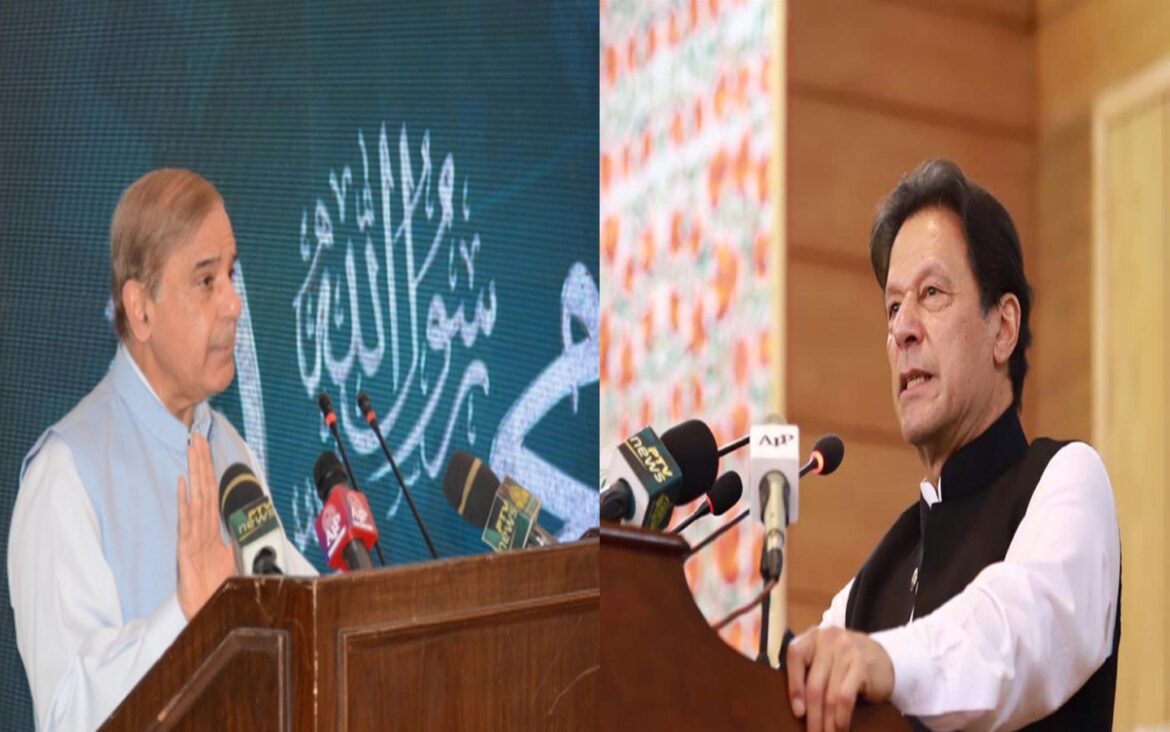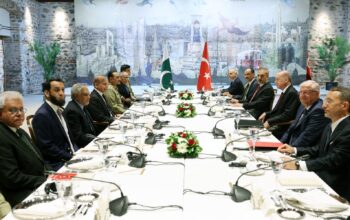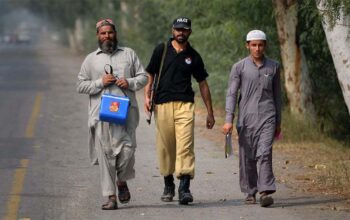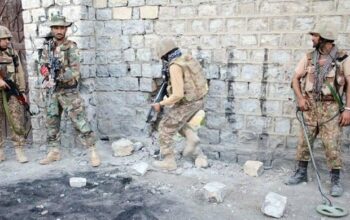With former Prime Minister Imran Khan gearing to besiege Islamabad, PM Sharif is considering early announcement of his choice for the next army chief.
By Ahmer Kureishi
ISLAMABAD: As a former prime minister prepares to lay siege to Pakistan’s federal capital, the incumbent is considering whether to announce the name of the next chief of army staff (COAS) a few weeks ahead of time to defuse the situation.
Apparently, the ruckus raised by Imran Khan is starting to get on the nerves of the Prime Minister Shehbaz Sharif, who heads a coalition government backed by the multi-party Pakistan Democratic Movement (PDM).
Independent Pakistan can report on good authority that revealing the Prime Minister’s choice for the appointment ahead of time is one of the options under active consideration to put the matter to rest.
The incumbent army chief Gen Qamar Javed Bajwa is due for retirement on November 29, 2022. He has publicly said, most recently during his US visit, that he is neither expecting nor is ready to accept any further extension in service as the army chief.
This necessitates the appointment of a new army chief. Khan, who was ousted by Sharif’s political coalition this April, has made it his mission to cll into question the prime minister’s right to appoint the next army chief.
The state of play
Khan has no standing to have any say in the decision, which is constitutionally the prime minister’s sole prerogative. But this has not deterred him from public speechmaking on the subject.
Recently, President Arif Alvi weighed in on the matter—on the side of Khan, who got him elected to the presidency back in September 2018, calling for a “broader consultation” to develop a consensus.
The Constitution of Pakistan does not require a “broader consultation” or a consensus in the matter, leaving it to the sole discretion of the prime minister, who is the chief executive,. Nor does Alvi’s office allow him a say in this (or any other) matter.
But he is the ceremonial head of the nation and the supreme commander of the armed forces – although nobody has quite forgotten how the same supreme commander held his peace when the same armed forces were under a disgusting smear campaign from PTI-aligned social media trolls and bots in the wake of a military helicopter crash in which several senior army officers embraced martyrdom.
The PTI’s media brigade has routinely thrown dirt on the armed forces ever since Khan’s ouster from power. The basis for this ill will has been Khan’s accusations and insinuations that the military and politicians conspired with foreign powers to oust him from office.
But the disgraceful campaign after the helicopter crash was perhaps the nastiest of all. Alvi was conspicuous at the funeral of the martyrs by his absence. It later surfaced that he had been politely told to abstain in view of the inflamed feelings of the families of the martyrs because of the campaign.
It’s Alvi vs the Parliament
Alvi is also the figurehead of Pakistan’s Parliament by virtue of his office. However, he has been at loggerheads with the same Parliament since just before Khan’s ouster, when he participated in a coordinated move to dissolve the National Assembly.
The Supreme Court of Pakistan (SCP) later nullified Alvi’s decree to dissolve the Parliament, and at least one judge pointed out the Parliament’s prerogative whether to try him (and others) for treason under article 6 of the Constitution.
Alvi has also been at loggerheads with the Sharif government ever since its inception this April. He has declined to administer oath office to cabinet ministers, which is one of the president’s august ceremonial duties.
And he held up laws passed by both houses of the Parliament and submitted for his ceremonial signature, besides generally espousing the various cause of Khan-led political opposition.
Small wonder, then, that when he addressed the joint sitting of the Parliament last week, a grand total of less than two dozen of the 442 members of Parliament were in attendance. Neither PM Sharif nor any member of his cabinet attended. Also absent were provincial governors and chief ministers, and the three services chiefs.
The President’s address to the joint sitting of the Parliament is a solemn annual ritual of the Pakistani republic, akin to the US President’s State of the Union Address. Abstaining from this ceremony en masse was a breach of decorum, but it went largely unnoticed in these turbulent times characterised by polarisation.
Precedents and rationale
Some influential ruling coalition members who support this course of action say a couple of precedents exist of the successive army chief’s name being announced ahead of time.
On Tuesday, Senator Ishaq Dar left for Washington DC to attend the annual meetings of the IMF and World Bank, starting this week. En route, he will make a brief stopover at London, where he will meet with former Prime Minister Nawaz Sharif. Party sources say the question of whether to announce of the name of the next COAS ahead of time will also figure in discussions.
Under the Pakistani law, constitution, and practice, selection of the next army chief is the sole prerogative of the prime minister. However, the summary for the appointment of the army chief is moved by the General Headquarters, and includes four or rarely five names.
This means the prime minister and the army will have to coordinate their moves and start the process early if a decision is made to bring the announcement forward.
Islamabad under siege?
The development comes as former Prime Minister Imran Khan, who heads his own Pakistan Tehreek-e-Insaf (PTI), is finalising his plan to orchestrate a long march on Islamabad.
Independent Pakistan can report that Khan has decided on a strategy to lay siege to Islamabad by choking all entry and exit routes, instead of entering the city.
The federal capital is bounded by the Punjab and Khyber-Pakhtunkhwa (KP) provinces on all sides, the former ruled by a Khan ally and the latter by his party. If he can mobilise enough people and resources, Khan should theoretically have no problem choking land access to the federal capital from all sides.
Many independent political commentators say that the appointment of new army chief at this juncture would send a signal of political stability, helping settle political dust in the country.
Copyright © 2021 Independent Pakistan | All rights reserved




